 Alec's Post
Alec's Post
Damn the Man!
Have you ever considered how your school functions as an institution? At crucial ages of development, it is our elementary and secondary schools, through established curriculum and social interactions in classrooms that socialize us and influence our own identity formation. Teachers play an active role, whether they are aware of it or not, in establishing gender norms by following curriculum that teaches heteronormativity and gender bias[1].
The role of curriculum in perpetuating gender bias among youth is being recognized by academics everywhere. Especially when youth enter into highschool, the materials they read and the standardized curriculum they follow is extremely biased. Teachers must become more aware that they might be “using texts that omit contributions of women, that tokenize the experiences of women, or that stereotype gender roles”[2].Is the burden solely that of the teacher’s though? No. Educational resources that are deemed as acceptable materials to be taught within the provincial educational system are decided by the Ministry of Education. An important role is also that of particular publishing companies that focus specifically on educational materials. The decisions made by these key individuals, authors and ministers, all play a part in perpetuating societal norms and gender stereotypes through the educational system. For example, English teachers are given a list of books that are acceptable to review, as well as required readings. Shakespeare was a literature genius, and although I enjoyed learning about his metaphors and themes, I never even considered that perhaps a “female” Shakespeare existed at one point. Perhaps there were female writers at the time who were just as thought provoking. We are taught what the word “misogyny” means and the only course that is most likely to offer reading materials written by women is Home Economics. Doesn’t anybody else recognize how problematic it is that these may be the only reference to the female gender in secondary school? It is important that teachers are “made aware of the bias they are reinforcing in their students through socialization messages, inequitable division of special education services, sexist texts and materials”[3]. But, the step to a more equitable form of education lies at fixing the root of the problem: we must convince the Ministry of Education in every province about the benefits of teaching gender-equitable materials. Research has shown that “gender-equitable materials allows students to have more gender-balanced knowledge, to develop more flexible attitudes towards gender roles”[4]. Although this seems like an impossible task, there are students who are beginning to notice how education works as an institution to perpetuate forms of gender bias within the school setting.
A group of female university students were relaxing one day when they began to talk about how much they love and have learned from their university gender studies courses. Dilani Mohan, Sheetal Rawal, Sarah Ghabrial and Lara Shkordoff were students at the University of Western Ontario when they met at the Women’s Issues Network on campus[5]. Reflecting on how much gender studies has empowered them as individuals while educating them about different forms of oppression in society and issues dealing with sexuality, these four friends decided to take action. As high school is a time of uncertainty and self discovery, it is not an easy time for many people. Gender Studies can offer a critical view of the world, and help students to not only become more aware of, but make sense of their place and identity in society. In 2005, Mohan and her friends decided to start the Miss__G Project for Equity in Education.
Letters to the Editor:
Thanks Damn the Man for your last issue dealing with the institutionalization of gender. The article called 'Equity in Education: Miss__G Project' provided some great information that I think everyone needs to hear. We often forget that the prescribed curriculum we all follow subtly contains everyday societal norms and biases. Gender is not a topic that is often talked about in high school because it is assumed that everyone is heterosexual. But this is not the case and I think that by introducing a discourse around gender, it could benefit everyone and make every student more confident with their identity. I find the Ministry of Education tries to ignore the fact that we live in a society that is diverse and they forget that not everyone fits into the prescribed categories of Male and Female. High school is such a tough time for youth, and I think that if organizations like Miss__G succeed, that the next generation of youth will be far more accepting and our society will become a better place. Let’s open up this dialogue and get everyone to think critically about their place in this world. I started a campaign at my school and more than 200 of my peers sent their face to our MPP in solidarity with Miss__G!
- Laurie, Saskatchewan
Megan Tremblay currently works as a community nutritionist specialising in paediatric and children’s nutrition. She is also the co-founder of Breakfast for Learning and runs the program at a local elementary school in Victoria. Currently working toward her Masters in Human Nutrition at the University of British Columbia, she is actively involved with a group called Mothers and Daughters which
specializes in women’s and children’s health.
Damn the Man! Spring 2012
Contributors:
Arielle Cohen
Alec Cumming
Ryan Fernandez
Tasha Rennie
Megan Tremblay
Damn the Man!
In this spring issue of Damn the Man!, we traveled across the globe to discover the various ways that gender inequality has been institutionalized. What do we mean by institutionalizing gender? We’re glad you asked! Institutionalization is the process by which everyday gendered behavior in society becomes legitimized within the system through the development of policies and regulations. Gender roles become normalized as they are incorporated into larger societal structures and institutions, thus creating inequality. This inequality rests upon the passive acceptance by society that being a male is superior to any other gender. Gender is generally accepted to be a socially constructed idea based upon our physical make-up. Despite the fluid nature of gender, it is still treated as a concrete notion within many societies that holds a lot of weight in determining how people are treated.
From the moment we are born, the first question that people ask is: Is it a boy, or is it a girl? Even before we inquire about the health of the baby, we have this need to know their gender. Why does it matter so much? Why do we have to identify one another first and foremost based upon our gender before we can conceptualize them as a person? We rarely take the time to reflect on how the answer to that first question will not only permanently mark your identity but will dictate the various opportunities available to you later in life.
Our first article by Ryan Fernandez digs deep into the topic of how we are trained to think about gender from a very young age, and how this affects the choices we make in life. Like robots down a conveyor belt, our paths our predetermined for us in society based upon what roles are acceptable for each gender. This training does not only take place on a broad societal level, as specific messages about gender have seeped into the very institutions we call learning spaces. Megan Tremblay hit the road and went around Ontario to study how educational institutions are one the most pervasive tools used to socialize our children into normalized gender roles. She visits Western University and teams up with the founders of Miss__G Project, an organization working to implement Gender Studies courses in secondary schools in Ontario, to write her article Equity in Education. Her article stresses the importance of creating a safe place based on gender equality in high schools, and to bring awareness to the sensitivity of people struggling with gender identities. Tasha Rennie’s article challenges heteronormativity head on and brings to our attention the struggle that many people must face in society: that of gender identity. Tasha has been researching the inclusion of gender identity and transgender rights within a human rights framework. Touching heavily upon our theme of the importance placed on gender before conceptualizing one another as people, this article challenges the notion of gender conformity.
As we shift our attention to an international focus, the manner in which gender inequality is institutionalized becomes much more
apparent. From public places, to property rights, and the workforce, the cultural biases that contribute to the creation of gender roles become engrained in society through policies and legislation. We journey with Alec Cumming into a world where religion plays the key role in the social and legal interactions of Saudi Arabia, leaving women distinctly disempowered. He speaks with several Saudi women's rights activists, and examines the difficulties in promoting change in such a traditional society, where discrimination is law, and the law is scripture. In Get Your Hands Off Our Land, Arielle Cohen analyzes the effects of the current famine in East Africa. She critiques the international political economy for the growing trend in land acquisitions, or land grabs. These unjust practices leave millions of women, who depend on agriculture production for their livilehood, destitute and begging for basic land rights that their governments that their governments deny them of.
Editorial


The Miss__G Project was founded on the belief that the failure to teach and discuss important issues like gender, race and sexuality in secondary school perpetuates societal gender norms and biases. Miss__G believes that without the critical engagement of students in secondary school, they may not only accept stereotypes as truth, but may learn that is it wrong to challenge them. Secondary schools should be offering courses which help students make sense of who they are and what the real world is like. Identifying as a “grassroots young feminist organization working to combat all forms of oppression in and through education, including sexism, homophobia, racism, classicism and albeism”[9], Miss__G Project is proposing that Gender and Women’s Studies courses should be taught in every Ontario Secondary School. They follow a strong mandate to do the best they can to provide high schools students, “especially young women, transgender, and gender non-conforming youth with the opportunities, support and resources necessary to analyze and influence issues that affect their lives and futures” (Chapman,2002). Most important is not only to offer a critical perspective on gender and society as whole, but also to offer a safe space for discussion and action between youth who may not conform to dominant societal norms.
Adjusting Gender Studies for a youth audience, Miss__G Project proposes that a high school course should be modeled, for the most part, after a university curriculum. Critical theories should be studied, as well as the institutional barriers that exist in politics, sports and the media that prevent women from living as equals in society. It is about introducing the notion that women are intellectuals who play an important role in society. But the main goal of the Miss__G Project is not only women’s rights, it is about equal rights for both genders. It is about empowering both males and females at a critical point in their lives, when they are struggling to make sense of their place in the world.
The Miss__G Project has been in constant contact with the Ministry of Education since 2008, when they announced that Gender Studies courses would be added to a new secondary school curriculum that was to be adopted by Ontario Secondary schools beginning in 2011. Due to editing issues, the Ministry has stalled implementation and has pushed back the date of a Gender Studies Curriculum until 2013. Miss__G Project is trying to pressure the Ministry to take the issue of educational equity more seriously and to keep Gender Studies at the top of their priority list. Under policy 7 of the Ontario Ministry of Education and Training document, section 13 deals specifically with Antidiscrimination Education[10]. Miss G__Project is using this section to underline the value of having Gender Studies implemented in secondary school curriculum as it can serve as a tool to promote antidiscrimination in schools. In this section, the Ministry openly states that “antidiscrimination principles in education…promotes a school climate that encourages all students to work to high standards, affirms the worth of all students, and helps them strengthen their sense of identity and develop a positive self-mage”[11]. Miss__G Project is pressuring the Ministry to abide by its own principles and recommendations by introducing Gender Studies into secondary curriculum as soon as possible.
[1] Chapman,A.(2002).Gender bias in education.Retrieved fromhttp://www.edchange.org/multicultural/papers/genderbias.html
[2] ibid
[3] ibid
[4] Klein, S. (1985). Handbook for achieving sex equity through education. Baltimore: The Johns Hopkins University Press.
[5] P.21 Colquhoun, M. (2006, Fall/Winter). The story of an orphaned curriculum. Shameless: News! Views! Music! Culture! Style! For girls who get it, pp.21-23.
[6] ibid
[7] ibid
[8] ibid
[9] The Miss G Project for Equity in Education.(n.d).Home.Retrieved March 13, 2012 fromhttp://www.wix.com/themissgproject/index_new
[10] ibid
[11] ibid
Deeply embedded with historical significance, Miss__G gets its name from the death of an intelligent female university student named Miss G. Following her death, a famous Harvard professor, Edward Clarke, published a book called “Sex in Education: Or a fair chance for girls” which included a theory about Miss__G’s death[6]. His diagnosis used the ‘Conservation of Energy’ theory, which stated that Miss G died because “women did not have the mental capacity to be educated, as it interfered with their primary biological function: reproduction”[7]. When the girls of Miss__G stumbled upon this story in one of their Gender Studies classes, they decided to adopt the name in order to raise awareness about the marginalization of women in education[8]

Equity in Education: The Miss__G Project

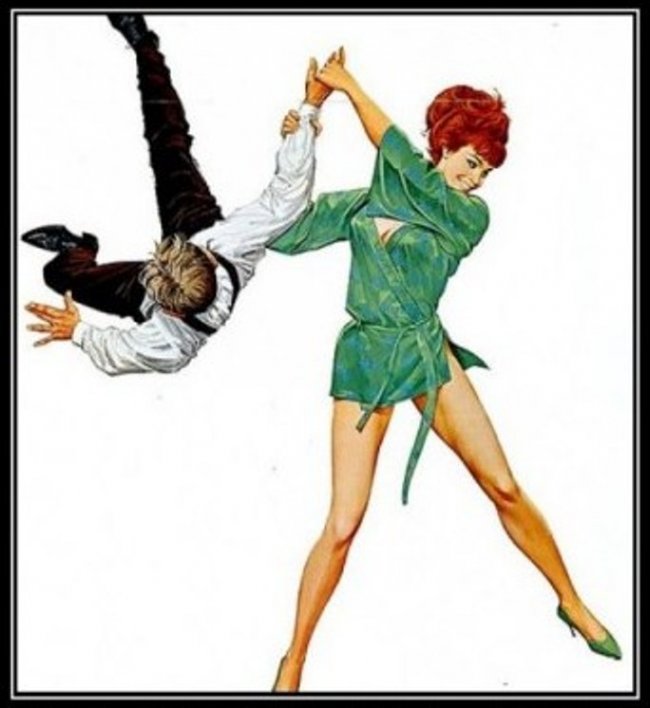

"If society will not admit of woman's free development, then society must be remodeled." -- Elizabeth Blackwell

Teaching
Equality
Pg. 5
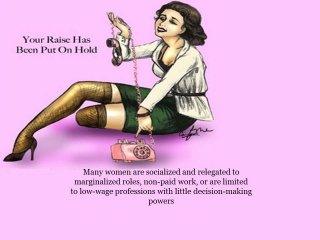
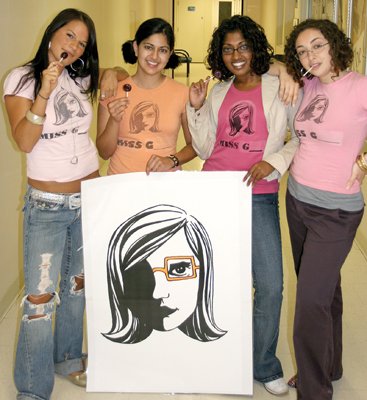
Did You Know?
- Of the 960 million illiterate adults in the world, two thirds are female
- Education is a critical ingredient in the empowerment process
- Only 43 percent of secondary school age girls are in class in developing countries
- Educated women are more likely to resist abuses such as domestic violence...and discrimination at home, in society or in the workplace

Join the Women's Faces in Education Campaign Today!
Either draw your self-portrait in this space, take a photograph of yourself and attach it here or visit our website at www.wix.com/themissgproject/index_new and use the face of Miss G herself!
This is my self-portrait/photo and I permit our partners Oxfam, Amnesty International and IANSA to use it to promote the campaign
Miss__G

Gender Myths
Weak vs Strong

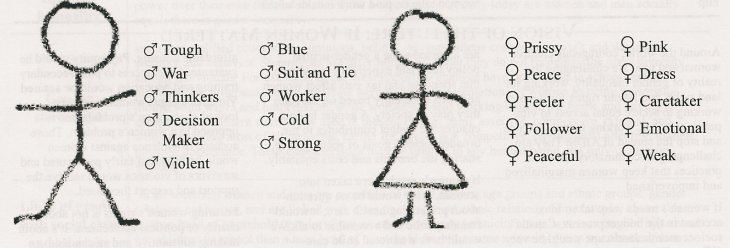
Why do we need to acknowledge these myths?
Because the worst thing you can call a man is a woman
Because women should not be paid the same amount as men because they are not of equal worth
We need a kind of Feminism that aims not just to assimilate into the institutions that men have created over the centuries, but to infiltrate and subvert them - Barbera Ehrenreich
Comic Relief

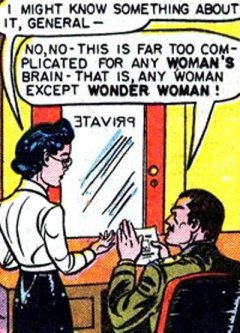
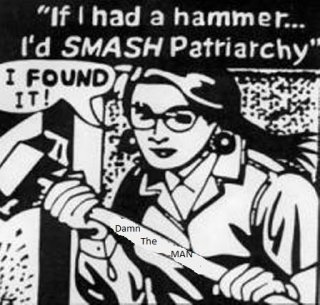
Table of Contents
Human Rights in Transition
by Tasha Rennie
On December 15th, 2011, the United Nations Office for the High Commissioner for Human Rights released its first ever report on the status of human rights of lesbian, gay, bisexual and transgender (LGBT) people around the world[i]. The report followed the historic resolution passed by the Human Rights Council on violations based on sexual orientation and gender identity in June 2011.[ii] The report highlights the forms of physical and psychological abuse and violence LGBT on top of other forms of discrimination that people have been subject to all over the world.
“Homophobic and transphobic violence has been recorded in all regions. Such violence may be physical (including murder, beatings, kidnappings, rape and sexual assault) or psychological (including threats, coercion and arbitrary deprivations of liberty). These attacks constitute a form of gender-based violence, driven by a desire to punish those seen as defying gender norms.”[iii]
The inclusion of gender identity in this report is significant. The report reveals that an estimated 680 transgender people were murdered in 50 countries between 2008 and 2011. The nature of violence against transgender people appears to be particularly brutal. In many countries there is little legal protection offered against these violations.
Yet, even in the most progressive countries, transgender people still face a level of discrimination significantly higher than many other minority groups.
In Canada, transgender issues were brought to the Parliament for the first time in 2010, with the introduction of the private members Bill C-389. Put forward by NDP MP Bill Siksay, the so-called ‘Bathroom Bill’, moved to add gender identity and gender expression to the Canadian Human Rights Act and Criminal Code.
Until this point, transgender people had been successful in challenging discrimination using the provisions on “sex” and “sexual orientation” of the Act. However, research from Carleton University has revealed that trans* people in Canada still face extraordinarily high levels of discrimination in the workplace and health care system, and often violence throughout their lives.[iv]
In February 2011, the bill was debated and passed through three readings before a positive vote moved it on to Senate. During the readings, the bill faced opposition from Conservative MPs, who officially claimed the amendment was vague and unnecessary. However, certain MPs, with ample support from groups like the Association for Reformed Political Action, the Catholic Womens’ League and REAL Women of Canada, were effective in mongering a good dose of ill-informed fear among their constituents over the “Bathroom Bill”.
Groups launched letter writing campaigns in opposition, and it is the nature of this backlash that illuminates not only the transphobia that exists in our society, but the inherent fear of gender defiance. Opposing arguments relied heavily on irrational misconceptions of transgender and transsexual people. The well-used bathroom argument proved to be a particular favourite.[v]
[i] UN issues first report on human rights of gay and lesbian people. (2011, December 15). UN News Centre. Retrieved from http://www.un.org/apps/news/story.asp?NewsID=40743.
[ii] UN Affirms human rights to transgender people. (2011, June 17). TGEU. Retrieved from http://www.tgeu.org
[iii] United Nations High Commissioner for Human Rights. (2011). Discriminatory laws and practices and acts of violence against individuals based on their sexual orientation and gender identity. Retrieved from http://www2.ohchr.org.
[iv] Bill C-389 (Historical). Open Parliament. Retrieved from http://openparliament.ca/bills/40-3/C-389/.
[v] Allen, Mercedes. (2011, Mar 26). Canada’s Trans Rights Bill C-389 Dies At Election Call. Retrieved from http://dentedbluemercedes.wordpress.com/2011/03/26/canadas-trans-rights-bill-c-389-dies-at-election-call/.
“Bill C-389 is a danger to our children,” said Charles McVety, president of the Institute for Canadian Values, to The Globe and Mail on February 10th, 2011. “If ‘gender identity’ is enshrined in the Criminal Code of Canada, any male at any time will be permitted in girls’ bathrooms, showers and change rooms as long as they have an ‘innate feeling’ of being female.”[i]
Not only irrational and based on absolutely no evidence, this argument is particularly cruel as it conflates trans* people with perverts and pedophiles, painting them in people’s minds as scheming sexual predators.
“As for the bathroom scare,” said NDP federal LGBT committee co-chair Mattew McLauchlin, “this one really hurts me. My partner is trans and I know what he goes through. In the more than one hundred jurisdictions around the world where similar protections have been put into place, there has never been a recorded case against anybody who has tried to engage in reprehensible behaviour in the washroom. Trans people already use washrooms and locker rooms, and it’s trans people who get subject to violence and discrimination.”[ii]
The bill didn’t get far in Senate, as there was no one to sponsor it as a priority. When the federal election was called shortly after, all pieces of legislation going through Parliament were thrown out. As of today, there are still no provisions for gender identity and expression in the Human Rights Act.[iii]
While trans* people will likely continue to fight discrimination with the existing provisions, the failure of this bill means a number of things. First, without specific legal protection against discrimination and hate, transphobia will continue to propagate within our society’s consciousness.
In regards to the UN’s report, Charles Radcliffe, the chief of OHCHR’s global issues section, told UN Radio that “one of the things we found is if the law essentially reflects homophobic sentiment, then it legitimizes homophobia in society at large. If the State treats people as second class or second rate or, worse, as criminals, then it’s inviting people to do the same thing.”[iv] The same can be assumed with regards to transphobic laws.
Second, it continues the institutionalization of the gender binary, and ultimately gender inequality. One of the biggest fears opponents of the bill put forward was that allowing gender identity, something that isn’t determined by biological sex, to be enshrined in legislation would lead to the destruction of the structured gender roles our society is built on.
"The implications of this bill are horrendous," said Gwen Landolt, vice president of REAL Women, "it changes the whole concept of gender."[v]
Opponents called the bill anti-family. But, by ‘family’ they undoubtedly mean a father, mother and 2.5 kids. A patriarchal society relies on a gender binary system where one gender inevitably dominates the other. When we trouble the idea of gender, suggesting that it is not inherent in our sex, and that it is, perhaps, neither male nor female, we begin to break down the dominant-submissive binary that has resulted in real, harmful inequalities for everyone.
[i] http://www.theglobeandmail.com/news/politics/ottawa-notebook/tory-veto-awaits-transgendered-rights-bill-in-senate/article1902266/.
[ii] Ibbitson, John. (2011, Feb 10). Transgendered-rights bill headed for defeat in Tory-held Senate. The Globe and Mail http://www.mcgilldaily.com/2011/02/bill-c-389-scores-a-victory-for-trans-rights/.
[iii] Payton, Laura. (2011, Mar 23). 10 bills become law Wednesday. CBCnews. Retrieved from http://www.cbc.ca/news/politics/story/2011/03/23/pol-royal-assent.html?sms_ss=facebook&at_xt=4d8b65d7f0517945%2C0.
[v] Turns, Paul. (2011, Jan 23). Canada: Transgender ‘Bathroom bill’ heads to third reading. Catholic Online. Retrieved from http://www.catholic.org/politics/story.php?id=40036.

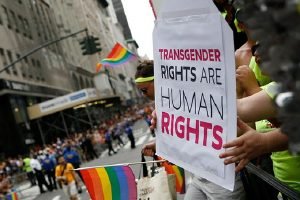

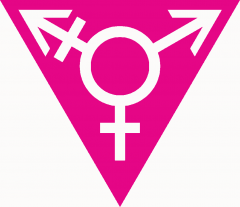
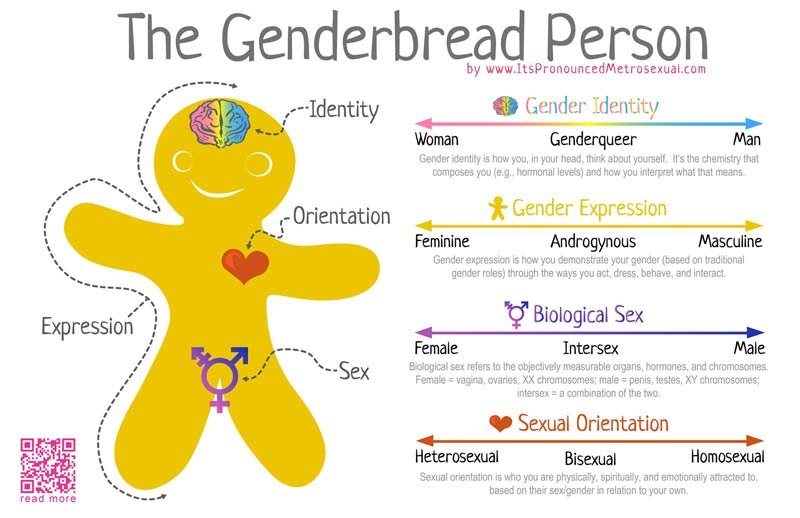
Some Terms
**Please note that these terms and their definitions are not universally accepted or agreed upon. Variations exist both within and outside trans communities in the usage and interpretation of these terms.
Trans: An umbrella term which refers to cross-dressers, transgenderists, transsexuals and others who permanently or periodically dis-identify with the sex they were assigned at birth.
Transgender: A range of behaviors, expressions and identifications which challenge traditional notions of sex, gender and sexuality in a given culture. Transgender refers to people who feel that their initial sex/gender designation is a false or incomplete description of who they are.
Transsexual: An individual who strongly dis-identifies with their birth sex and wishes to utilize hormones and sex reassignment surgery (or gender confirmation surgery) as a way to align their physical body with their internal gender identity.
Transvestite: An older term, synonymous with the more politically correct term cross-dresser, which refers to individuals who have an internal drive to wear clothing associated with a gender other than the one which they were assigned at birth. Transvestite has fallen out of favor due to its psychiatric, clinical and fetishistic connotations.
Cisgender: a class of gender identities where an individual's gender identity matches the behavior or role considered appropriate for one's sex.
Tasha Rennie is a Pulitzer Prize winning journalist from Vancouver. She has a combined Master’s degree in Gender Studies and Russian Literature, and enjoys fencing and sudoku in her spare time. Tasha is a prominent feminist/lgbt/environmental/anti-corporation/animal rights activist and has been arrested 18 times during protests and rallies.
I just wanted to write in and thank you for your inclusion of transgender rights in your discussion on gender inequality. I think it is important to acknowledge transgender people when we discuss gender, and also to remind the general public of the inequalities they still face, even in Canada and Europe. We’ve seen this recently with the sterilization issues in Sweden and other European countries. As well in Canada, with the recent issues regarding airline screening regulations. I think these issues show that even though we’ve come pretty far, we still have a ways to go in our fight for equality for everyone.
- J.D., Ottawa
Film Recommendation:
Southern Comfort (2001)
A documentary that follows the final year in the life of Robert Eads, a female-to-male transgender person who was diagnosed with ovarian cancer. Doctors in the Southern United States refuse to treat Eads due to his gender identity. By the time he receives treatment it is too late. The film focuses on the struggle of transgender people to reconcile their own identities with the norms of their societies, and the community of resistance and support created by transgender people to combat these challenges. Southern Comfort won the Grand Jury Prize for Documentaries at the 2001 Sundance Film Festival.
Arielle Cohen studied at the London School of Economics, dropping out after first year to start an organic farmer’s co-op in southern Ecuador in 2002. Since then she has written several New York Times Best Sellers on the importance of community based agriculture programs in both urban and rural settings. She currently holds a teaching post at the University of British Columbia. Arielle IS currently working on her fifth book, entitled “Race to the Bottom.”
Disclaimer: We are not referring to male gender,but rather institutions and systems that perpetuate gender inequality
Ryan Fernandez is now a book keeper at the Library of Interesting Things Which May Not Appear So At First glance, located in Aberdeen Scotland. After spending the first 7 years of his Undergraduate degree taking distance courses and searching for the meaning of life in the valleys and mountains of South America, he moved on to finish his degree and spent those final 4 years studying The History of Interesting Things at The Stratford Career Institute; the first to graduate from that program. After moving to scotland in 2010, he witnessed the famous kidnapping of Donnie Galloway, and embarked on a journey into the depths of the Atlantic Ocean; a story which would later be adapted into a film in the winter of 2011. Deciding to settle down, he gained employment at the Library of Interesting Things, and spends his days when not at work arguing in the comment sections of online newspapers.
Alec Cumming is a graduate of Dalhousie University, and received a Masters in Global Development Studies from Queen’s University. He is currently working as a CBC news correspondent in the Middle East and North Africa, specializing in issues of development and gender equality in Muslim countries. A former co-chair of the Married to Rights organization, which focuses on issues of spousal abuse in the Greater Toronto Area, he is a passionate activist with extensive experience in organizing grass-roots campaigns.
In response to the article entitled ‘The Long Road to Reform', I would just like to express my concern with the author’s lack of focus on western-based female rights organizations and their role to play in Saudi Arabia. While it is certainly true that real change in Saudi Arabia will require a shift in cultural ideals, and that it can be difficult for a non-Saudi organization to promote change without becoming bogged down in accusations of cultural imperialism, I think it is non-the-less important to acknowledge that these are rights that are guaranteed in the Universal Declaration of Human Rights. While Saudi Arabia refused to sign the Declaration, a number of other Muslim nations, like Pakistan, have signed and have actively criticized the Saudi position. This alone provides a basis for outside critique and justifies the pressure from western-based organizations on the Saudi Arabian government, who fails even to recognize the most basic protection of human dignity. No government should be excused from this kind of outside criticism; these rights are called universal for a reason.
-Heather, Edmonton
Thanks Damn the Man for your last issue. As always, I eagerly await its arrival every month. I found the article 'Get Your Hands Off Our Land' to be incredibly informative and interesting. I had no idea that this phenomena of land grabs was taking place, let alone the profound impact on the millions of women involved in agricultural production. I applaud your magazine for taking such a staunch opposition against the roller coaster of price fluctuations that has occurred in the price of grains in the last 4 years. Venture capitalists and investment bankers need to wake up and realize that speculating on a basic commodity affects not only the price, but also only hurts millions of people worldwide.
- Steven, Missouri
Human Rights
In
Transition
Pg. 7
The Long
Road to
Reform
Pg. 8
Get Your
Hands Off
Our Land
Pg. 9
RenderBy
Gender
Pg. 10
Damn The Man, I wanted to thank you for your article last issue regarding the shortfalls in our system in terms of the way we think and act based on gender. I wanted to add to your point, reinforcing the fact that it is us who maintains this system of patriarchal values, and it is us who must begin to alter it for the better. Furthermore, I wanted to let you know that I believe it is those patterns of thought which we learn from as young as the age of 2, which you have mentioned, that are responsible for more than just issues surrounding gender, but a mass of cultural issues which all intertwine, leading society down a destructive path. If we don’t re-think fast, who knows where the world will be in the future?
- Ivan, Iqualuit
Gender Myths...........................4
Equity in Education.................5
Megan Tremblay
Comic Relief..............................6
Human Rights in Transition...7
Tasha Rennie
The Long Road To Reform.............................8
Alec Cumming
Get Your Hands Off Our Land...............9
Arielle Cohen
Render By Gender................................10
Ryan Fernandez
Further Exploration..............................11
 Magazine Posts
Magazine Posts Table of Contents
Table of Contents